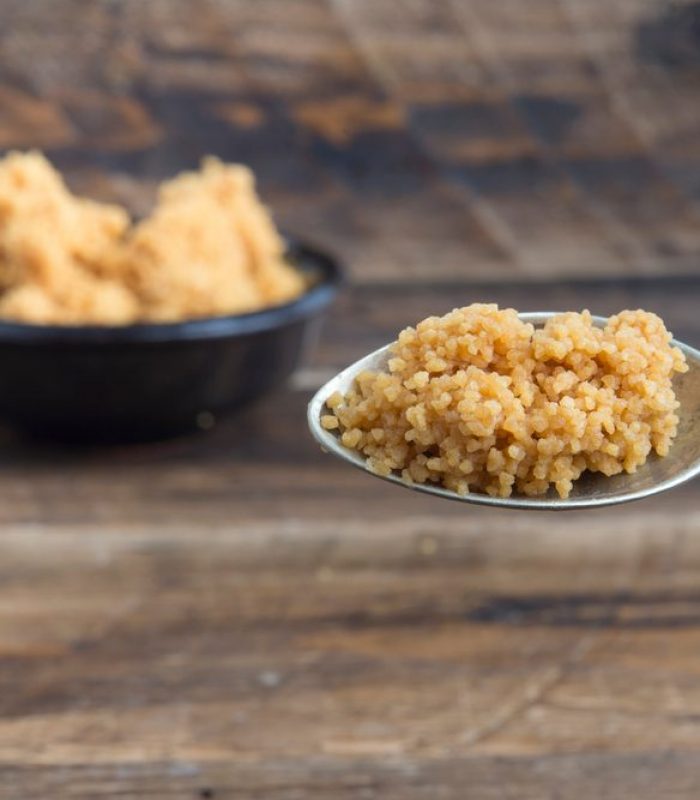Weed powder is tasteless, odorless, and has a long shelf life. Make it as a kitchen pantry staple.
With all the talk of ketogenic diets, paleo diets, leafy green vegetables, and healthy fats, carbohydrates often get a bad rap in today’s society. But what if, rather than helping you gain unwanted pounds, those old carbohydrate ingestion pathways were the optimal route for a form of cannabis medicine? After all, every carb has a silver lining, and recent evidence suggests that the potent and fast-acting cannabis oil powder is absorbed through these very pathways.
What is Cannabis Oil Powder?
Also called weed powder, this is a fine powder devoid of flavor and odor that contains dissolved water-soluble cannabinoids. It can be added to just about anything — solid or liquid — and offers several advantages over traditional edible administration.
One such advantage is a faster onset time after consumption. This is where carbohydrates enter the equation. When you eat carbohydrates, you actually begin to digest them in your mouth via the uptake pathways. And as luck would have it, the body recognizes this form of powdered cannabis, with its water-soluble properties, as a carbohydrate, and thus piggy-backs into your system on this old highway.

What are the Problems With Traditional Edibles?
A study carried out in 2018 noted that, due to the low oral bioavailability of cannabis, alternate methods of administration should be proposed and researched.
This low oral availability stems from the fact that cannabinoids are hydrophobic by nature. Put simply, it means these compounds don’t dissolve in water. Traditionally, edibles must be made with different types of fats or oils to provide the fat-soluble cannabinoids a pathway to activation.
Even then, these compounds still have to navigate the entire digestive system. The first stop is the stomach, then onward to the small intestine before being metabolized in the liver. It’s a long and arduous journey that takes time – perhaps an hour or more. And even then, digestive inefficiencies and differences between individuals mean that people will feel the effects differently and at varying intensities.
Cannabis oil powder negates all of this by giving cannabinoids an easier route. But to do that, we first have to overcome the hydrophobic issue of cannabinoids that refuse to mingle with water molecules.
How to Make Cannabis Oil Powder
The process is quite simple, but as with any cannabis recipe, it’s too easy to mess up an entire batch by missing one small step. Take your time. Here’s what you’ll need to do to convert ⅛ ounce of cannabis into a cannabis oil powder. Recipe adapted from Vapor Asylum (adapted from CannaDish).
- This first step is vital: decarboxylation. This converts THCa into its active form, THC. Use an oven with strict temperature control and place the cannabis inside at 220-240F. Leave it for 45 minutes while keeping the oven door closed. There are other, more discreet methods (here) that can keep the smell down if that is a concern where you live.
- Once decarboxylated, grind your cannabis. It should be dry and light brown in color.
- Add 1/4 cup of your preferred oil – coconut oil works well. You can use other oils, such as grape seed, as well.
- Add 1/2 teaspoon of sunflower lecithin powder. This is an emulsifier that helps stop the solution from separating.
- Place the mixture in a closed jar and then place the jar in a saucepan of boiling water for 2-3 hours. Do not let it boil over or lose water.
- Once complete, strain the solution through a cheesecloth. Be sure to push all of the oil through. Alternatively, you can use a French Press to separate the oil from the plant.
- Now for the carbs. Mix in 3/4 cup of maltodextrin – a corn-based carbohydrate. It holds the secret to this method of administration. Its water-soluble nature means it works great.
- Once mixed together place mixture in a sieve and shake out a fine dried powder. You can now consume this with anything!
Where and How Can You Use Weed Powder?
There’s no end to the ways in which cannabis oil powder can be used. Being water-soluble, the cannabinoids are fully activated and bioavailable as is. It’s tasteless and odorless, which means that it mixes well with almost anything. Sprinkle the powder on food, take it alone, or mix in with a beverage.
Once consumed, you should begin to notice the effects very quickly. While it takes an hour or more to notice the effects of traditional edibles, you’ll feel fully medicated with cannabis oil powder in as little as 20 minutes. A common starting dose is 5mg of THC, which is below the dose range of many edibles.
One common issue with edibles is that of consuming too much. Impatience often takes over if the elevated effects aren’t noticed immediately. So, it’s all too easy to consume too much. But after becoming more medicated than you meant to be, you’ll learn quickly that patience is a virtue!
In powder form, the activation process works very differently. With the quick onset time, it’s relatively easy to evaluate if you need to top up with more after 20 minutes. And with the easy access pathway, the digestion process is both less intensive and less dependent on the current backlog within your digestive tract.
Now, that’s what we call a win-win.






Madeline Ekott
Please can you use melt canna butter and use it directly
Jennifer Grant
Sorry Madeline, I’m not sure I understand your question. If you are asking if you can substitute the oil for butter, it’s not recommended. The butter will spoil and is not shelf stable at room temp like oil is.
Alicia
How where do you store it? What type of container? And how long can it be stored before going bad? Sorry, I’m new to all of this. Thank you.
Jennifer Grant
Hi Alicia – it should stored in a glass container with a lid that closes tightly. I am not sure about the expiry. I have send a message to the author. I would not go over a month with DIY recipes like this as the water content is variable and there are no added preservatives.
Troy Soper
Can you use a cannabis extract instead of flower?
Jennifer Grant
Hi Troy – you can use definitely use cannabis extract. Just be sure to calculate your liquid ratios to be the same.
Wendy
Can you please explain how this can be zero calories when maltodextrin has the same amount of calories as table sugar?
Thank you
Jennifer Grant
Hi Wendy – I’d say that is incorrect! Thanks for the catch. It has been changed.
Steven Howe
How to you figure out the dosage? How much powder do you end up with? Can the strength be changed?
Jennifer Grant
Hi Steven – you’ll end up with about 3/4cup of dry powder. To calculate the strength (THC potency) try this calculation:
Recipe calls for 1.8 ounce of cannabis = 3.5g
Let’s say the strain I am using is 13% THC. I’m going to turn that into a decimal and g into mg:
3.5g = 3500mg
3500 x 0.13 = 455mg THC in the whole thing.
Then you’d have to calculate based on what you are using. So, if I was using 1tbsp (and there are 12 tbsp in 3/4cup) it would be 455/12 = 37.9mg THC per tbsp
Can the strength be changed? Yes. You can also use a more potent strain, one with a higher THC potency. You can make a stronger infusion by adding more cannabis to the oil or using a professional infuser that has less heat waste. Keep in mind though, that the cannabinoids need the fat in the oil and after a certain point, adding more bud is just wasting your bud (bc there is no more fat left to accept the infusion).
Garoni68@gmail.com
Hi Jennifer,hope all is well.I need your expertise I’m making ripple THC powder and I have mixed together the oil with the meltidextran ,but there is moisture and it is on the clumpy side not fine powder.Can you Gide me on the drying process.I know I am going to need a Vacuum Oven but I don’t know the temperature and what type of pump and oven Suits this process.Thanks for your guidance!Al G.
Jennifer Grant
Hello 🙂 I am definitely no expert. Still so much to learn. I’m the person who communicates from writers to readers. To get rid of clumping, you can shake it through a flour sifter after it’s dry (or even a fine-mesh sieve). For drying – there isn’t the need for a vacuum oven. Please note, this recipe is meant for home use and without the tech that companies use to create THC powder commercially, it will still have that homemade and feel. If you have a vacuum oven at home, great. But, I have no insight into temp and time. Have you squeezed it through a cheese cloth to get rid of excess moisture (after mixing)? Alternatively, a French press coffee maker will help with that process.
kevin
if i use commercially made cannabis distillate oil, do i just mix it into the maltodextrin powder and then add some sunflower lecithin powder until evenly mixed?